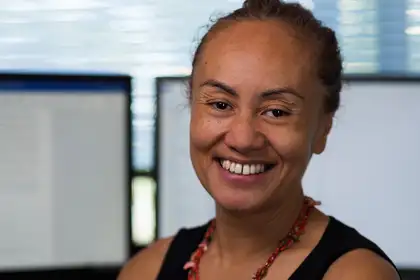
School of Psychology Associate Professor Julia Ioane
The most popular advice from these young people to their younger self, was to “stay in school,” and their advice for the justice system was also similar “help them stay in school.”
The rarely heard views of young Pacific people, their parents and caregivers were explored over three years by School of Psychology Associate Professor Julia Ioane, with a particular focus on mental health in relation to culture, family, spirituality, and the young person’s experience of the youth justice system.
The research, which was funded by the Health Research Council of New Zealand, used Pacific values and principles to engage with participants. From the 20 young people and their families that took part in the research. Dr Ioane heard that there were feelings of disconnection and an absence of their voice and culture throughout the justice process.
Dr Ioane says the definition of mental health is not widely understood by young Pacific people in the study and were subsequently less likely to access mental health support and substance abuse services. Youth were at risk due to ongoing use of alcohol and drugs, and association with friends who were involved with offending behaviour.
Perhaps not surprisingly, she says, parents were more concerned about their adolescents’ behaviour than were the young people themselves, as shown in questionnaire responses and interviews.
“Relationships with staff and parents were fundamental to reducing the risk of recidivism amongst Pacific youth, alongside positive changes in their family over time. For example, when parents improved their communication skills with one another, and for those who persevered in their determination to support their young person, despite sometimes being blamed by wider family members, there was a more positive outcome.”
Young people who found good employment or education relationships, or connections with a positive significant other, also fared better.
Dr Ioane says the young people in the study were very proud of their identity.
“Cultural connection such as Samoan, Tongan, Fijian, whether they were New Zealand or island-born, provided an opportunity to reduce recidivism.”
However, Dr Ioane says that pride can also complicate matters, as it did not coincide with their offending behaviour, given that values of respect and love are fundamental to Pacific cultures.
“Likewise with church,” she adds. “Half of the research sample attended church, highlighting the potential role of the church as an intervention to deter further offending behaviour.”
Dr Ioane says her research has highlighted an opportunity to aid prevention and early intervention strategies for working with these communities, from within deep connections with home, school, culture and spirituality.
The study also found economic stress was a significant contributor to poor mental health.
“The findings showed a need to include social and economic factors when assessing offending behaviour and how to improve the economic and financial wellbeing of the young person and their families, to reduce offending risk. It also highlighted that families needed be involved from the start, designing and implementing intervention plans.”
Dr Ioane says we need to increase peer-based interventions as part of the youth justice system.
“If we are to truly work towards preventing our Pacific youth entering the justice system, we need to take our work into their homes and be guided by them.
“These are Pacific people who have been disconnected, disrespected, and disengaged from the systems created to support them. Connection is fundamental to working with our underserved communities and this study reminded us of this importance.”
The research has recently been published on Massey Research Online in a paper titled 'You've just got to think about your family and what type of person you want to be. Listening to young Pasifika people in the youth justice system and their families.'